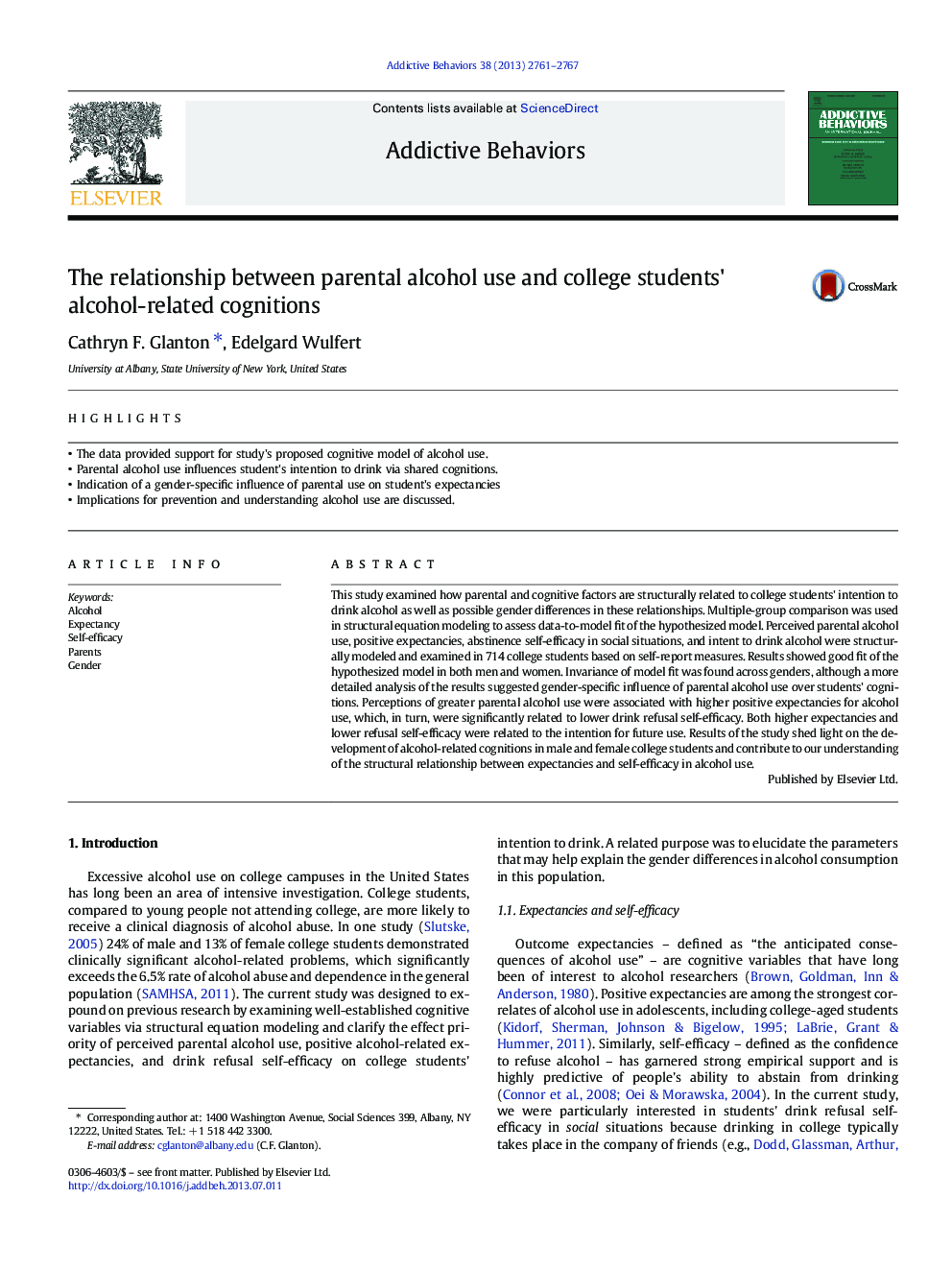| کد مقاله | کد نشریه | سال انتشار | مقاله انگلیسی | نسخه تمام متن |
|---|---|---|---|---|
| 10443386 | 915366 | 2013 | 7 صفحه PDF | دانلود رایگان |
عنوان انگلیسی مقاله ISI
The relationship between parental alcohol use and college students' alcohol-related cognitions
ترجمه فارسی عنوان
رابطه بین مصرف الکل والدین و تأییدات مربوط به الکل مربوط به دانش آموزان کالج
دانلود مقاله + سفارش ترجمه
دانلود مقاله ISI انگلیسی
رایگان برای ایرانیان
کلمات کلیدی
الکل، انتظار خود کارآمدی، والدین، جنسیت،
ترجمه چکیده
این مطالعه به بررسی اینکه چگونه عوامل والدین و شناختی از لحاظ ساختاری مربوط به قصد دانش آموزان کالج برای مصرف الکل و همچنین اختلافات جنسیتی در این روابط است، بررسی شده است. مقایسه مدل چند متغیری در مدل سازی معادلات ساختاری برای ارزیابی مدل داده های مدل به مدل فرضیه استفاده شده است. استفاده از الکل مصرفی والدین، انتظارات مثبت، خودکارآمدی خودداری از بارداری در شرایط اجتماعی و قصد نوشیدن الکل، در 714 دانشجو بر اساس اقدامات خود گزارش شده، مدل سازی شده و مورد بررسی قرار گرفته است. نتایج به دست آمده نشان داد که مدل فرضیه خوبی در مردان و زنان وجود دارد. انحراف مدل مناسب در میان جنس ها یافت شد، اگر چه تجزیه و تحلیل دقیق تر از نتایج نشان داد که تاثیر جنسیتی والدین بر یادگیری دانش آموزان تاثیر متقابل جنسیتی دارد. ادراکات مصرف الکل بیشتر والدین با انتظارات بالاتری مثبت برای مصرف الکل همراه بود، که به نوبه خود به طور معناداری مربوط به خودکارآمد بودن خودکارآمد نبودن نوشیدنی بود. هر دو انتظارات بالاتر و خودکارآمدی خودکارآمدتر نسبت به قصد استفاده در آینده ارتباط دارد. یافته های این مطالعه بر روی پیشرفت های شناخت های مرتبط با الکل در دانشجویان دختر و پسر تأکید دارد و به درک ما از رابطه ساختاری بین انتظارات و خودکارآمدی در مصرف الکل کمک می کند.
موضوعات مرتبط
علوم زیستی و بیوفناوری
علم عصب شناسی
علوم اعصاب رفتاری
چکیده انگلیسی
This study examined how parental and cognitive factors are structurally related to college students' intention to drink alcohol as well as possible gender differences in these relationships. Multiple-group comparison was used in structural equation modeling to assess data-to-model fit of the hypothesized model. Perceived parental alcohol use, positive expectancies, abstinence self-efficacy in social situations, and intent to drink alcohol were structurally modeled and examined in 714 college students based on self-report measures. Results showed good fit of the hypothesized model in both men and women. Invariance of model fit was found across genders, although a more detailed analysis of the results suggested gender-specific influence of parental alcohol use over students' cognitions. Perceptions of greater parental alcohol use were associated with higher positive expectancies for alcohol use, which, in turn, were significantly related to lower drink refusal self-efficacy. Both higher expectancies and lower refusal self-efficacy were related to the intention for future use. Results of the study shed light on the development of alcohol-related cognitions in male and female college students and contribute to our understanding of the structural relationship between expectancies and self-efficacy in alcohol use.
ناشر
Database: Elsevier - ScienceDirect (ساینس دایرکت)
Journal: Addictive Behaviors - Volume 38, Issue 11, November 2013, Pages 2761-2767
Journal: Addictive Behaviors - Volume 38, Issue 11, November 2013, Pages 2761-2767
نویسندگان
Cathryn F. Glanton, Edelgard Wulfert,
